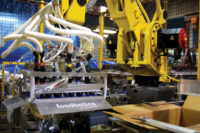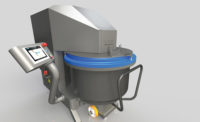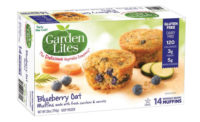“There are always customers that make due,” says Lance Aasness, vice president, sales and marketing, Hinds-Bock Corp., Bothell, Wash. “Others are taking advantage of the ‘new economy,’ and investing in higher-speed equipment to increase their market share. Our customers that feed the retail markets seem to all be busy.”
When it comes replacing depositors, dividers and rounders, bakeries and snack manufacturers of all sizes will find plenty of versatile, efficient and easy-to-use models from which to choose. Here are a few newer models.
Depositors
Hinds-Bock recently added the HB 24P-08 multi-piston, cantilevered depositor to its family of high-speed, industrial muffin, cupcake, brownie and cake depositing machines. The 24-piston 24P-08 features a positive shutoff spout for accurate, tail-free deposits at speeds of up to 1,200 pieces per minute and a programmable logic controller (PLC) with an operator interface. The entire unit can be disassembled in minutes without tools.
“Our customers are continually asking for faster speeds, greater accuracy, quick changeover and rapid sanitation,” says Aasness. “These requests led to the development to the 24P-08.”
When equipped with a moving spout bridge and injection spouts, this family of depositors also can be used to inject cream or fruit fillings into muffins and sweet goods.
According to Stewart Macpherson, vice president sales and marketing for Unifiller Systems Inc., Vancouver, B.C., recent developments in Unifiller’s depositor offerings include servo-driven depositors that are basically all-electric-driven and computer-controlled. “The advantages to the customer are that several of the depositing parameters can be saved into a recipe and retrieved instantly the next time as needed,” he explains.
Dough dividers
WP Kemper Bakery Systems Ltd., Shelton, Conn., the North American subsidiary of WP BakeryGroup in Germany, offers dough dividers that focus on dough piece-oriented dividing, rather than dough band dividing. The dividers feature the Voluminator, a unit that allows bakers to set the pressure for each dough piece and can divide most existing doughs, from stiff and cold to sensitive doughs, with pre-fermentation periods of eight to 10 hours.
The V300, for instance, handles most common dough types, including sensitive; and dough varieties, including wheat, wheat/rye pizza, pizza and soft. It can produce from 500 to 1,500 dough pieces per hour. The V500 can be used for wheat dough, rye dough up to 70% rye and dough with high-water absorption. It’s also suitable for sensitive dough and dough with a long floor time.
“The Voluminator has been the most important technological advance made in our dividers in recent years,” says president Patricia Kennedy. “This unit, which is part of the dividing cycle on our WP Haton dividers, guarantees a minimal pressure on the dough and avoids extrusion of the dough during dividing. The cell structure of the dough can be maintained by controlling the pressure. With the Voluminator, it’s possible to make a product like ciabatta (with an open texture) and a toast loaf (with a fine texture) on the same divider with the same dividing principle.”
Swedish bakery equipment manufacturer Glimek Baking System, meanwhile, has introduced the patent-pending Glimek SD-600, a stainless-steel, volumetric dough divider with two, three and four pockets. The Glimek SD-600 has a capacity range of 1,000 to 3,000 dough pieces per hour; 1,500 to 4,500 dough pieces per hour; and 2,000 to 6,000 dough pieces per hour, respectively. “The company designed this machine to do double the production of the two-pocket machine that we’ve handled for many, many years,” says Merle Cooper, Midwest regional sales manager for Belshaw-Adamatic Bakery Group in Seattle, which represents the Swedish bread systems manufacturer in the United States.
The Glimek SD-600 also has a wide scaling range (from about 4 oz. up to 3 lb.); stepless, adjustable pneumatics for gentle dough handling; and an easy-to-use touchscreen for setting and storing recipes.
“It was really designed for the U.S. market,” Cooper says of the divider. “[Companies in] the United States tend to want to buy one piece of equipment to do everything versus [those in] Europe, where they buy multiple lines. They’ll buy one line dedicated to one product and another line dedicated to another product, which is fine with smaller dividers. Here, we needed a bigger divider to go to wholesale bakeries and do 6,000 pieces an hour.”
Reiser’s Vemag dough divider (VDD) for bread and pizza dough, on the other hand, is designed for midsize producers running single-lane bread lines. The VDD can run a full range of varieties, absorptions and crumb structures and, like the dual-lane Reiser dough divider, which it complements, is gentle on dough, while providing weight control.
“It follows the same philosophy as all our dividers—unmatched sanitation, very high capacity with room for growth, simple operation and versatility,” says John McIsaac, vice president, strategic business development, of the Canton, Mass.-based company.
Rounders
Customer demand prompted Reiser to also add Eagle rounders to its equipment offerings. The high-speed units are designed for bread and bun lines and can be used with Vemag dough dividers. Eagle Bread rounders are available in one- to two-lane configurations for rolls and muffins, and are available with up to nine lines.
Mid-sized and small bakeries will appreciate the latest addition to the Rex line of dough dividing and rounding machines from Koenig Bakery Systems, Ashland, Va. Introduced in October at Südback 2011 in Stuttgart, Germany, the Mini Rex Multi completes the product range around the Mini Rex and the Mini Rex Futura.
The new model offers a wide weight range from 0.5 oz. to 11.5 oz. at one- to three-pocket operation, and an hourly capacity of up to 3,600 pieces per hour. An easy-to-learn operator panel is designed for a plug-and-play installation, while easy-to use tools facilitate quick product changeovers. Mini Rex Multi core parts also can be disassembled for easy cleaning.
While few companies relish the thought of buying new baking equipment, whatever the economic climate, the benefits of replacing, rather than repairing, essential machinery are usually well worth the investment.





